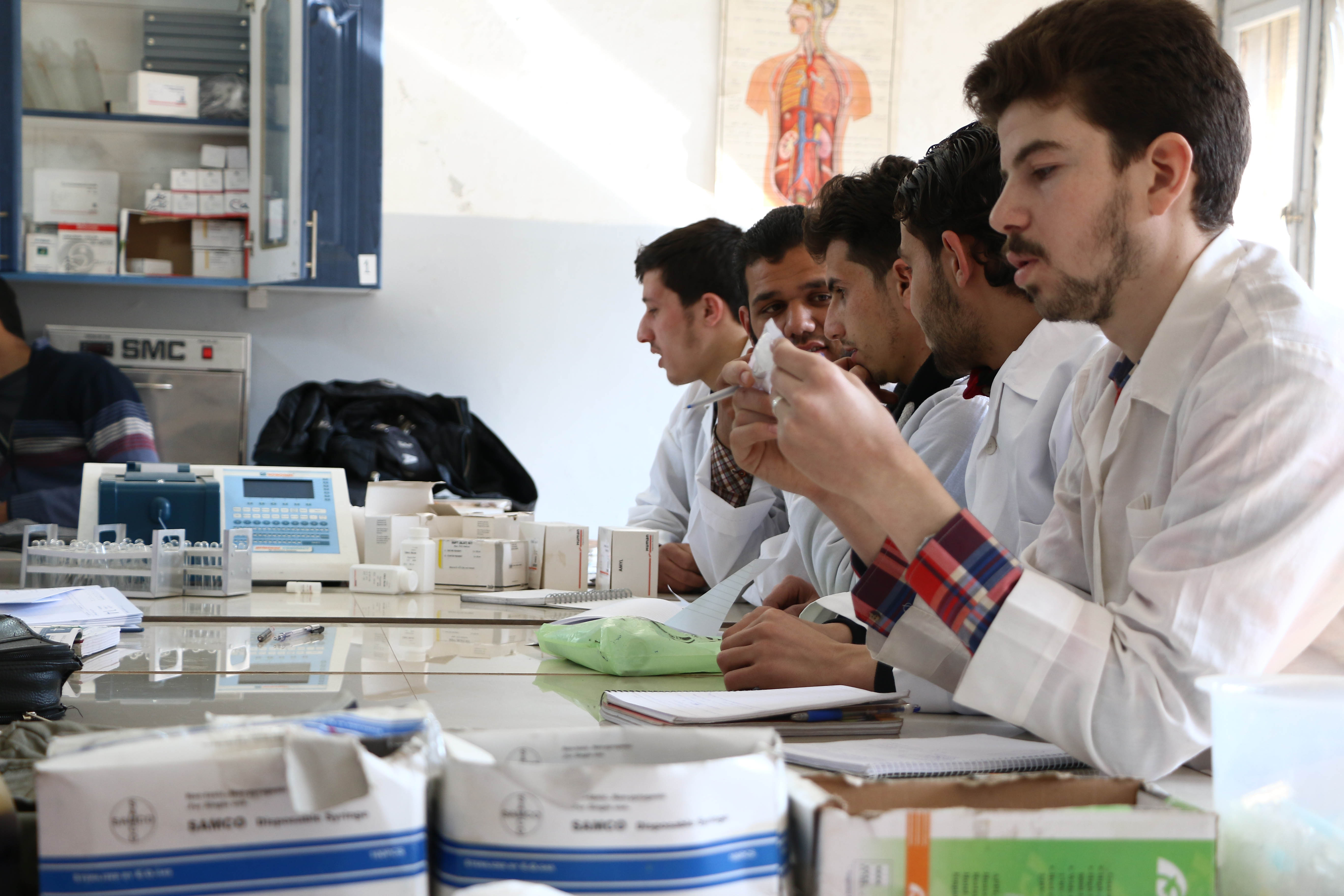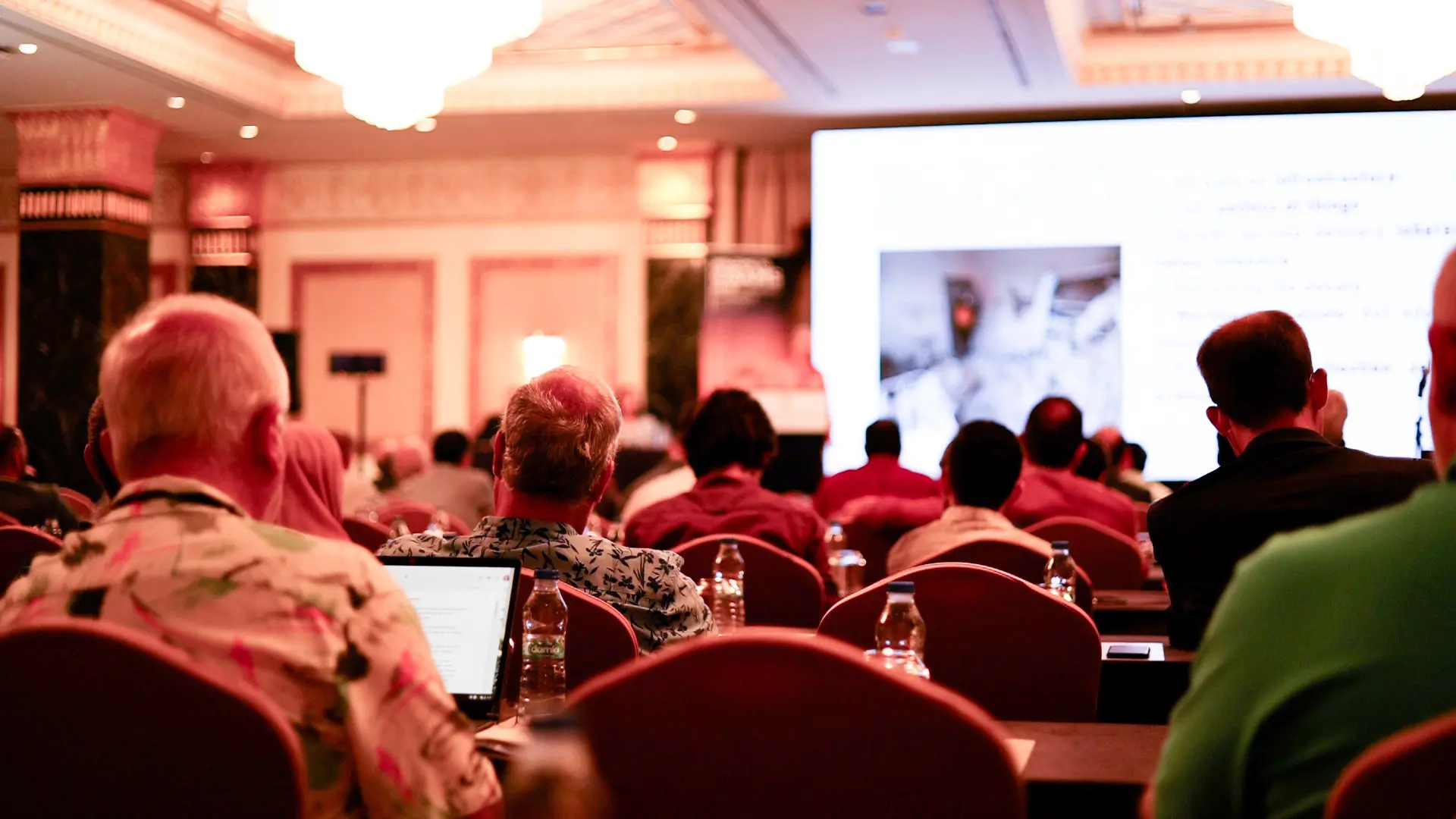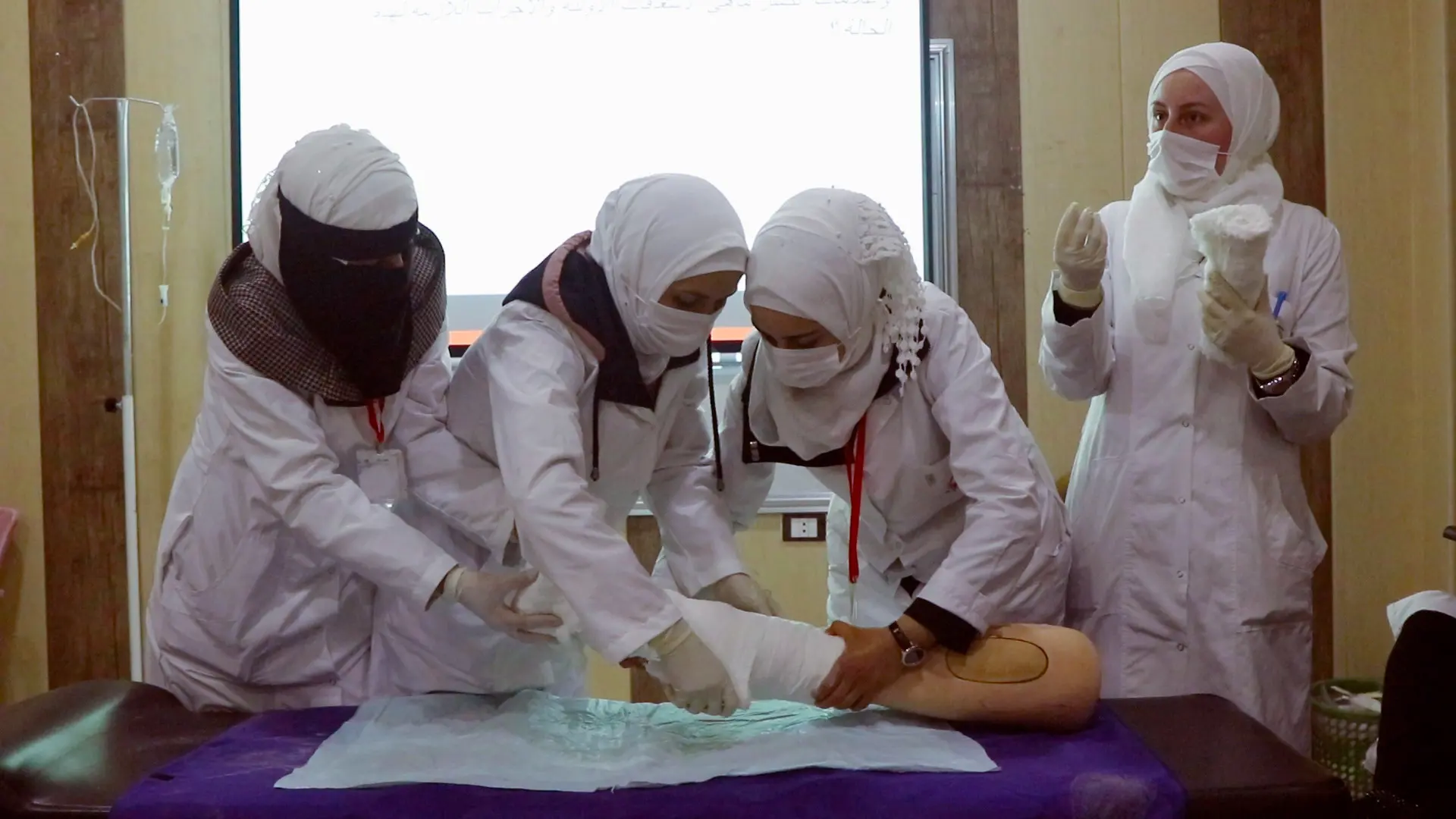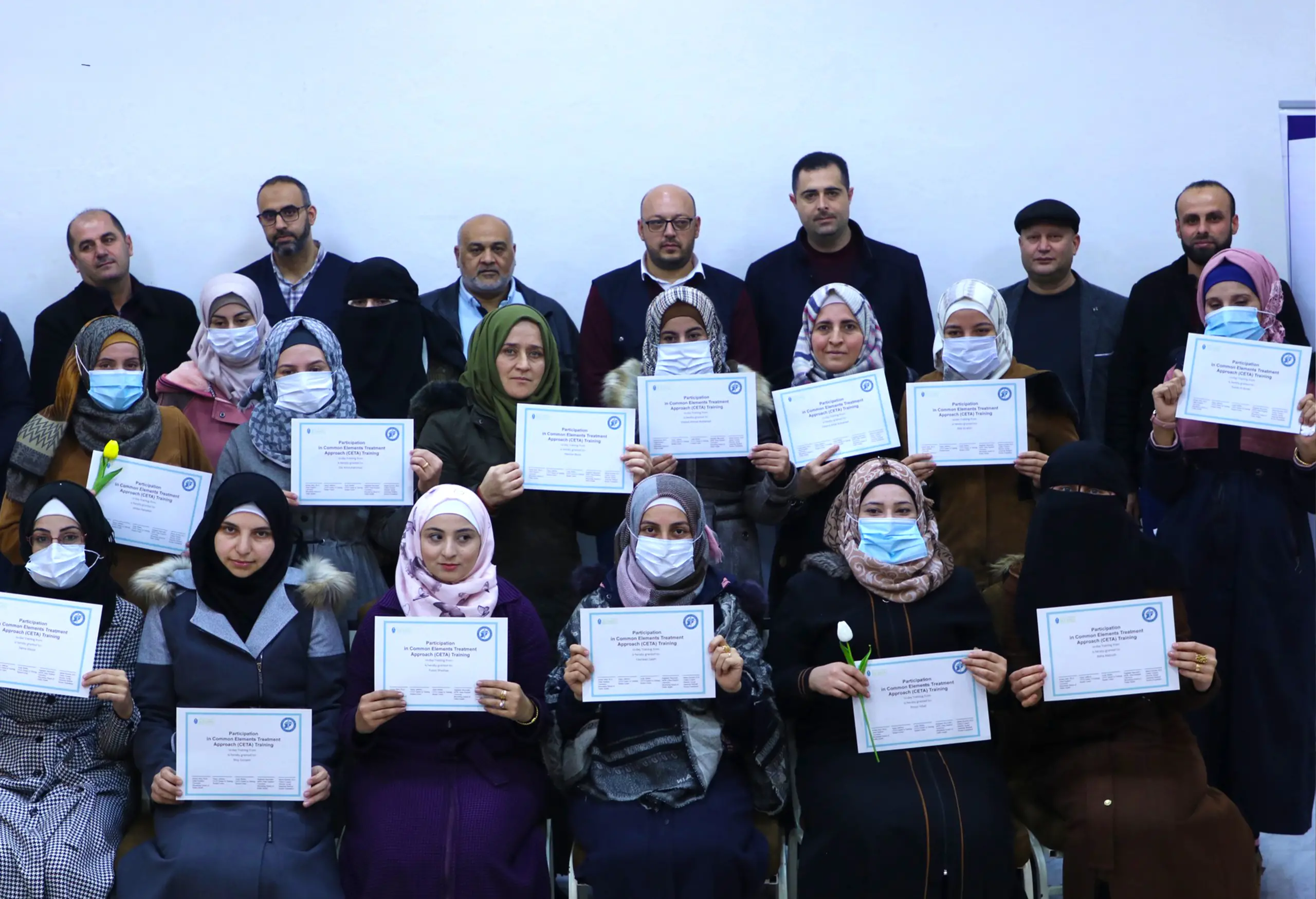About SAMS Institute
The SAMS Institute, composed of SAMS leadership committee members, was established in 2022 with the purpose of expanding the variety and improving the quality of SAMS medical education programs in northern Syria.

Mission
To support the excellence of education for conflict-affected health professionals in Syria and beyond in service to improve the health and wellness of all.
Managing the shortage of qualified healthcare providers is difficult in Syria, where ongoing conflict, resource deprivation, and displacement mean that the provision of immediate healthcare to patients is often prioritized above longer-term medical education and training programs. The exodus of many healthcare workers, particularly trainers, professors, and instructors, stalled the country’s medical education quality. Given the conflict’s longevity and the debilitated healthcare system, immediate attention must be paid to funding, developing, and delivering expanded medical education and training for long-term sustainability and increasing the capacity of the health workforce, especially in north Syria.
SAMS implements undergraduate and postgraduate initiatives, including training programs for physicians and other health professionals. Our focus is increasing the quality of training and the monitoring and evaluation of such programs. SAMS offers in-person and remote training programs to maximize cost-effectiveness and accessibility for students and engage international instructors and educators.
View our medical education briefing note from 2022.
Undergraduate Medical Education
 SAMS has continuously provided financial resources and mentorship support for students pursuing a career in the health professions in the United States and abroad. In addition, SAMS conducts medical missions to northern Syria and neighboring countries and invites medical students from the region to participate in specialized courses that focus on key subjects such as critical care, cardiology, pathology, and oncology. Feedback from these courses has been excellent, with students noting the scope of knowledge, skills gained, and the localization to the context. Certain SAMS programs in the region host students as interns under agreements with their universities, such as SAMS MHPSS program in Jordan and SAMS mobile medical team in Greece.
SAMS has continuously provided financial resources and mentorship support for students pursuing a career in the health professions in the United States and abroad. In addition, SAMS conducts medical missions to northern Syria and neighboring countries and invites medical students from the region to participate in specialized courses that focus on key subjects such as critical care, cardiology, pathology, and oncology. Feedback from these courses has been excellent, with students noting the scope of knowledge, skills gained, and the localization to the context. Certain SAMS programs in the region host students as interns under agreements with their universities, such as SAMS MHPSS program in Jordan and SAMS mobile medical team in Greece.
In the broader field of undergraduate medical education, SAMS has developed a portfolio of programs over the years in different countries. Through the work of SAMS Education Committee, This has included the Mentorship Program, which matches Syrian physicians with residency applicants to guide the residency application process; Online Education Projects that include topical lecture series for Syrian students and physicians; and the Scholarship Program, which provides interest-free loans to support Syrian medical graduates in the US during residency interviews season.
For more information on SAMS Education Committee and their work, please visit their webpage.
Post-graduate Medical Education

SAMS implements several post-graduate medical training programs in northern Syria, which has become a growing priority in recent years and even more so following the protracted conflict and the earthquake in 2023.
SAMS currently manages over ten residency and fellowship programs that enroll medical graduates. These programs include pediatric, ophthalmology, general surgery, orthopedic surgery, pathology, ICU, hematology/oncology, and neurology. Many of these residency programs are managed by local physicians with mentoring and remote supervision from SAMS physician members predominantly based in the United States.
Since its inception, SAMS has trained over 30 residents and fellows into practicing physicians in north Syria.
Continuing Medical Education

Since 2012, SAMS has provided educational and training opportunities to medical personnel working in Syria to address gaps in healthcare provisions and ensure that health workers are up-to-date with the latest medical developments and innovations. This includes updating and standardizing hospital practices, introducing new interventional procedures, responding to outbreaks such as COVID-19 and Cholera, recognizing and treating victims of sexual and gender-based violence (GBV), and specialty care like dialysis, stroke management, and psychosocial support.
Supporting the Allied Health Professions
In response to the need for more specialized healthcare providers, SAMS has established two midwifery programs and one nursing program in northern Syria.

Midwifery
The midwifery program has over 100 midwives graduates to increase the healthcare workforce’s capacity to provide maternal care services. The midwifery program comprises two tracks – an 18-month intensive program for certified nurses and a three-year program for eligible candidates who have at least a high school degree and meet other selection criteria.
Graduates of these programs have credentials recognized by WHO, UNFPA, and the local health sector.
Nursing
To increase the healthcare workforce in northern Syria, SAMS has administered various nursing programs for nurses and nursing assistants. Over 200 nurses and nursing assistants have graduated from this program.
As of late 2022, SAM has developed the curriculum for a specialist nursing diploma in Adult ICU Care, currently lacking in Syria. Once implemented, the Adult ICU Diploma curriculum will be made available across the region as a reference and building block to promote standardization within this nursing field.
Mental Health

In response to the rising mental health needs and lack of qualified mental health workers, SAMS and higher education institutions in northern Syria are working with international academic partners to develop a master’s degree and two professional diploma programs in the fields of clinical psychology, psychiatry nursing, and social work, to standardize cadres, develop trainers, and graduating 100 MHPSS providers over the next two years.
At the community level, SAMS has also piloted the Child Common Elements Treatment Approach (CETA), to train non-specialists – predominantly women – to provide evidence-based mental health support for youth within their communities, thus reducing the burden on higher-trained professionals. This system offers continuous supervision by Arabic-speaking CETA trainers until counselors demonstrate competency.
In addition to successfully building capacity and reducing mental health symptoms, the CETA system also strengthens equity by bringing women into the workforce and providing them with financial compensation. It is also designed to allow flexibility in scheduling so they can work around their household or childcare responsibilities.
SAMS Scholarship Program
Since 2016, SAMS has provided scholarships to empower Syrian refugee students to continue their educational journey in medical and dental schools and other healthcare fields like physical therapy, psychology, nursing, and nutrition. SAMS has provided scholarships to over 100 Syrian students in Turkey, Lebanon, Jordan, and Bosnia & Herzegovina universities.

